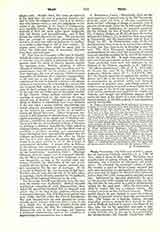

Vrau, PHILIBERT, “the holy man of Lille“, organizer of numerous Catholic activities; b. at Lille, November 19, 1829; d. there, May 16, 1905. His father was a manufacturer of sewing thread; his mother, Sophie Aubineau, was a Parisian of refinement and intelligence. He attended the municipal college of Lille. His teacher, a pupil of Victor Cousin, inspired him with such enthusiam for philosophical problems that after receiving his degree he devoted what leisure he had to them with a few young men he grouped around him. Influenced by unsound philosophy, he gave up the practice of his religion for four years, yet during this time he was active in a purely philanthropic society for the aged poor. After his conversion in 1854 he turned this into a religious society. His mother’s prayers for him had been constant. Whole-souled always, he now desired to enter the religious life, but his parents’ need of their only son restrained him. The failure of a banking scheme, through imprudent partners, plunged them heavily in debt; and as Philibert had now to retrieve the losses of the firm, none but the lay apostolate was open to him. After his conversion his ambition was to make Lille a truly Catholic city; in this aim he was seconded by his brother-in-law, Dr. Camille Feron-Vrau (1831-1908), who had been his most intimate friend from childhood. Feron-Vrau had not shared the philosophical aberrations of Philibert, but had studied medicine in Paris and was established at Lille, the friend of the poor and a skillful practitioner. When a new partner was needed in the Vrau firm in 1871 he abandoned his professional career. He established religious and beneficial societies for the working people, planned model dwellings for them, and also organized a society of employers and employees to close the gulf infidelity was making between capital and labor. He insisted on the right of the laborer to a living wage. In all this Philibert Vrau cooperated. Feron-Vrau was arrested in 1892 for allowing a religious element in the association of employers and employees of which he was president, and it was dissolved by law, but was soon revived under another name. Nocturnal adoration of the Blessed Sacrament was introduced into Lille by Philibert Vrau in 1857. He was largely instrumental in establishing Eucharistic Congresses. Urged by Mlle Tamisier, Msgr. de Segur had appealed to Philibert Vrau, and the first congress was held at Lille. Catholic education from the primary school to the University of Lille owed much to him and to Feron-Vrau (see Lille). Both greatly promoted the efficiency of the Conference of St. Vincent de Paul and multiplied its numbers. Feron-Vrau did much to Catholicize the medical profession, notably through the Society of St. Luke. After the death of his mother in 1888, Philibert Vrau devoted his time almost exclusively to prayer and numerous good works. He travelled much in these interests but in the humblest way. At the Vatican he was a familiar figure. The power of the press for good had not been overlooked by him, but to his nephew, Paul Feron-Vrau, the systematized apostolate of “The Good Press” is due. Philibert Vrau was sentenced to a month’s imprisonment and a fine for allowing some Sisters of Providence, though now in secular dress, to continue their superintendence of the women in his factories, a charge which they had begun in 1876. An appeal was made and the case was called up again two days after his death. In the crypt of the Church of Our Lady of Trielle, built by their efforts, are the busts of the two men who had worked so hard to super-naturalize all the activities of life.
B. RANDOLPH

